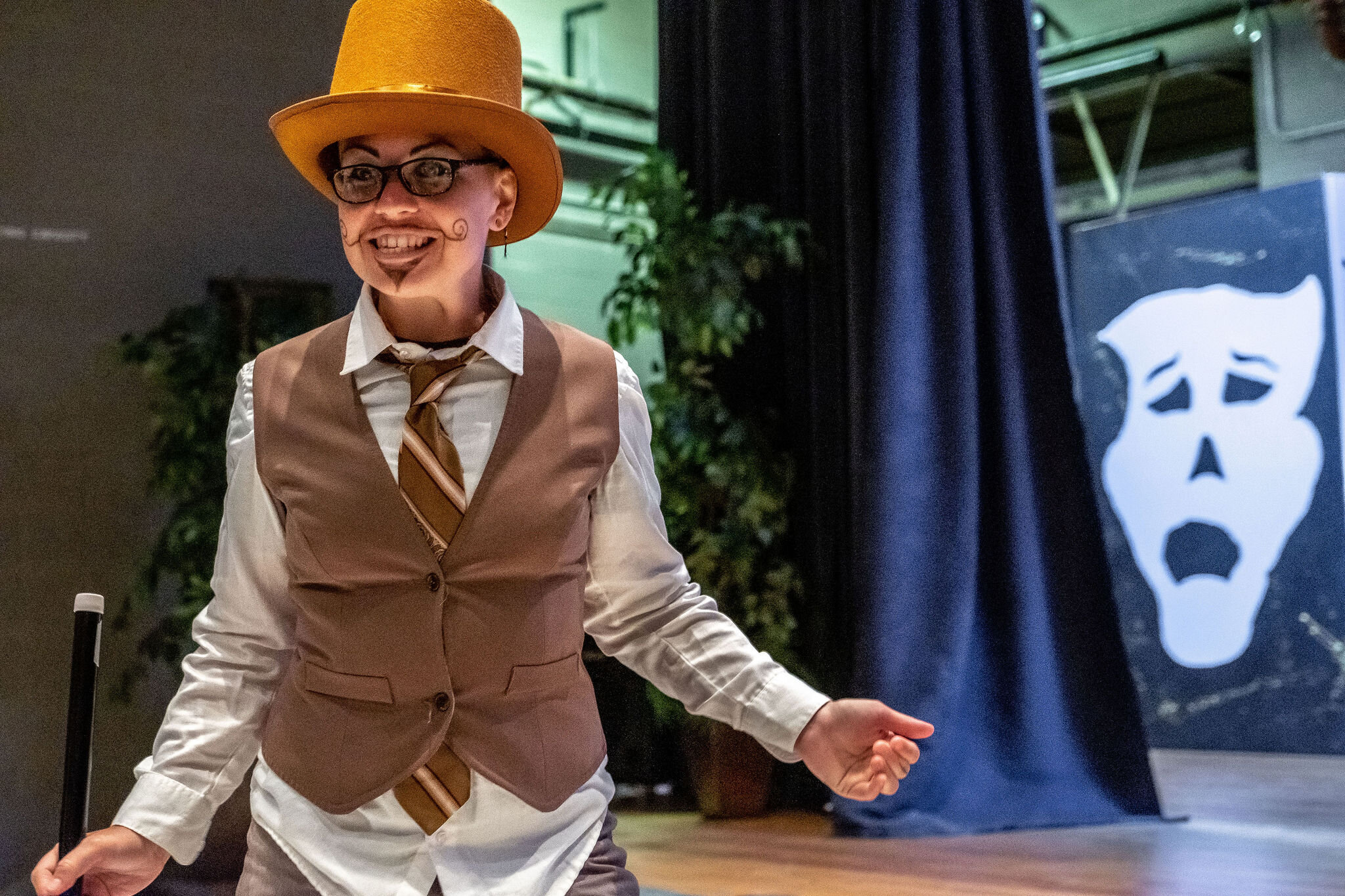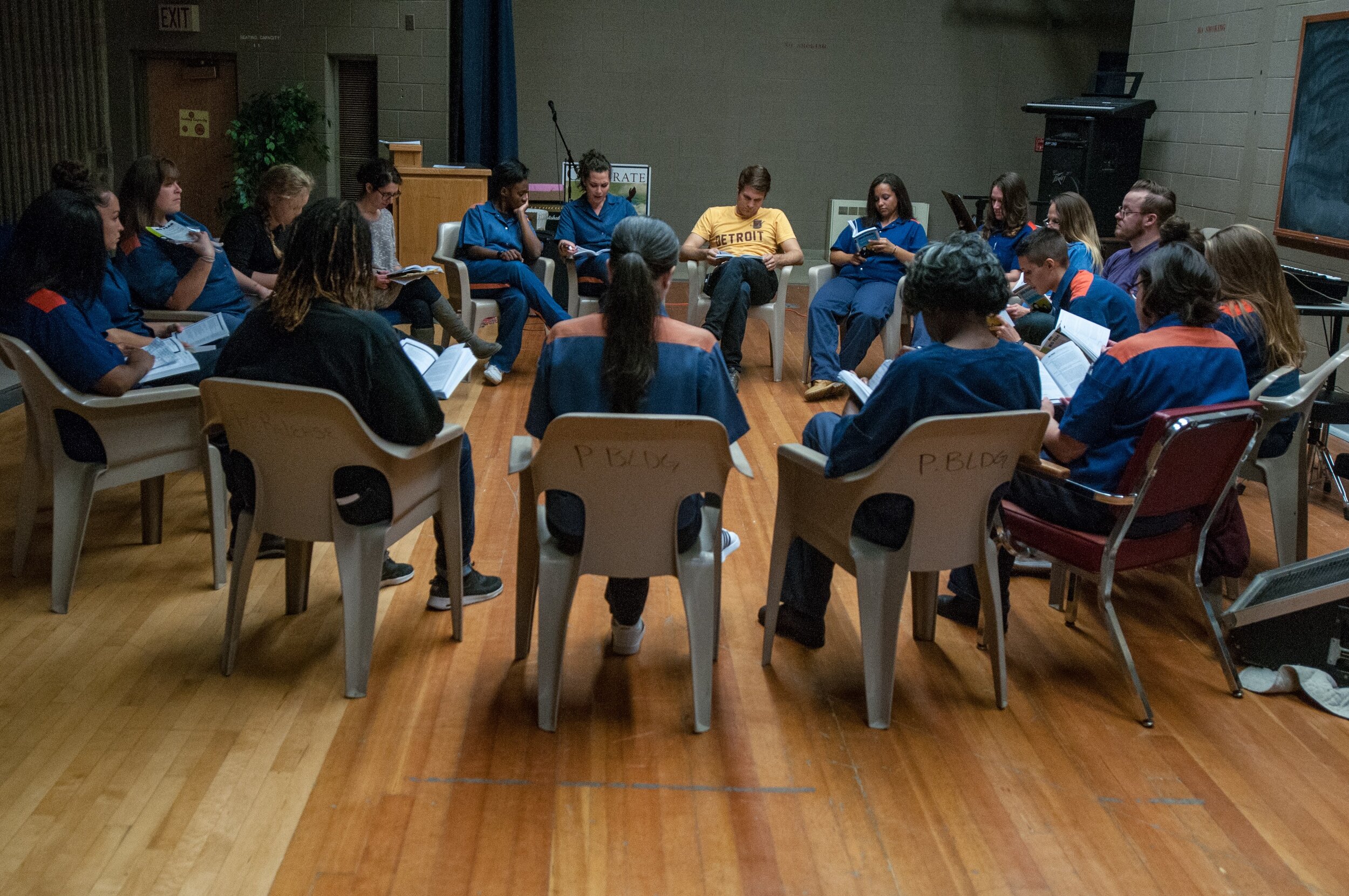“You have really blossomed in this group.”
Tuesday / February 25 / 2020
Written by Emma
It’s getting to be that time in the season where we need to start figuring out show logistics--chiefly, costumes and props. Maria and I went in with a plan to have one-on-one discussions with each ensemble member about costume ideas. As we circled up, folks seemed enthusiastic about this phase.
One member stated during check-ins that she had two questions for us. “1. What game are we playing? And 2. What are we doing with the lines?” She held up her script. “I want to cut them.” A few other ensemble members said that they, too, would like to spend some time making cuts. Our Horatio, on the other hand, expressed that she wanted to spend some time going over blocking in 1.1 with our Marcellus and Barnardo. By the time we raised the ring, it was settled that we would be breaking into small groups to tackle the multiple tasks we had in mind today.
I was primarily talking to individuals about costumes. Most of them envisioned something simple--plain shirt, pants, and shoes, perhaps a prop or two. The actor playing Lucianus, however, had a really neat idea for her costume. Lucianus is meant to represent Claudius in the play-within-a-play. As such, this ensemble member thought it would be smart to have Lucianus dressed head-to-toe in red (which is Claudius’ family color). A great thought, and very fitting with the over the top nature of the playlet we’ve been envisioning.
While I was busy with that, Maria helped a few ensemble members work through cuts. Folks would propose areas that they felt could be trimmed, and Maria (armed with her wealth of experience) helped determine if they were, indeed, cut-able. Lots of meaty textual discussion happened. And it was awesome.
In the back of the house, Horatio worked hard with her scene partners to sort out blocking. She instructed them on how they could march about the stage as though on guard, with a focused and directed energy. When everything else had slowed down, and we had about twenty minutes of rehearsal left. We decided to see the fruits of their labor and ran 1.1.
Horatio, Marcellus, and Barnardo walked pensively across the stage and through the aisles of the house. Occasionally, Horatio would point or quietly direct her scene partners, but for the most part, everyone seemed to know where they should be. While Horatio was delivering a monologue, the two guards marched back and forth across the stage in front of her. Frustrated, Horatio kept trying to get their attention, following one or the other until she finally stepped between them, bringing them to a stop. It was genius!
Marcellus and Barnardo expressed anxiety that the marching would be distracting. I told them that, actually, with the calm and uniform way they were doing it, it made the scene more interesting. It wasn’t over the top; it was just enough to give the feel of being “on guard,” which is exactly what they were going for. They seemed to be happy to hear that. We ran the scene one more time, decreasing the distance they walked, and voila! It looked amazing.
With that, we were out of time. By breaking into small groups, we were able to tackle three tasks at once tonight. Efficiency may be one of our strongest assets this season!
Friday / February 28 / 2020
Written by Maria
One of the important things about theater is finding the right balance between work and play. We have spent a lot of time over the last few sessions diving into the decision-making of production design, coming up with our overall concept while deciding what props and costumes we need. So today we were overdue for some fun!
One ensemble member is always pushing for us to play improv games, and today she was joined by a few others, joyfully requesting we play something fun with everyone. We started with a game of Questions and then moved on to a round of Rock, Paper, Scissors, Beyonce. In Questions, you sit in a circle and one person turns to either side and asks a question, and that goes on until someone takes too long to respond, says something that isn’t a question, or repeats a question. When one of the women asked, “What’s your problem?” with a little bit of attitude, we all broke down into giggles. Rock, Paper, Scissors, Beyonce is a very energetic game with a lot of over the top gestures as you work your way up and down levels after winning or losing a round of rock, paper, scissors with someone.
After a lot of laughter and warmth from moving quickly around the stage, we decided to dive into scenework. We started with Hamlet’s “To be or not to be” speech in Act 3 Scene 1. “I must be cruel only to be honest,” our Hamlet explained as she attacked Ophelia with her words. She explained that Hamlet is actually trying to save Ophelia, even though she knows that Ophelia is being used by Claudius and Polonius to spy on him. It was a short session with this scene, but it was beautiful and moving.
Our Player Queen then jumped up and asked to work the play-within-a-play. We decided to work on the dumb show since we hadn’t worked on that part of the play since casting those roles. Shakespeare wrote a fantastic blend of comedic and dramatic scenes and monologues in his works no matter what genre the play was. When working on a tragedy like Hamlet, these comedic scenes can feel like a breath of fresh air and a chance to really play with going over the top.
We’ve decided that our Players are going to be “extra,” with bright clothing and big gestures while they are acting. After running the dumb show once, one of the women in the audience pushed for a comedic effect, asking Lucianus, “Can you tiptoe like a villain?” Personally, I’m excited that the ensemble member who is playing the Ghost is also doubling in the role of Lucianus—the poisoner in the play-within-a-play. The contrast of the dramatic plea at the top of the show for vengeance, to the cartoony murder with a giant bottle of posion being done by the same woman, who was so quiet at the beginning of the season, is just thrilling. “This is going to be really good!” our Player Queen exclaimed.
We then moved on to Act 3 Scene 3, with Claudius struggling after seeing the play. Since Claudius begins the speech alone on stage, I asked who she was talking to. “I’m talking to God and myself,” Claudius replied. “Am I gonna die? And if I die, is heaven gonna take me? Is it too late to repent?” “We get a window into Claudius’ inner turmoil,” a perceptive member of the ensemble agreed. We toyed with whether we wanted the curtain closed for this scene to make it feel more intimate and closer to the audience, which reminded me that Claudius was standing right where we just saw the Player King get murdered. It gave our Claudius more to work with as she struggled through her emotions of guilt and greed.
The final scene we worked was Act 4 Scene 5 and Ophelia’s madness, though we were missing our Getrude. The group playfully pressured one woman to stand in for the role, and they were incredibly supportive of her choices. “I like how you did your thing,” the game-loving ensemble member said. The woman playing Ophelia had stark shifts in emotion as she worked her way through her songs, aggressively speaking to the group watching her in fear and sadness with her “I pray you, mark” lines. When Kyle asked how the scene had felt, Ophelia said that she felt the first part went well but the second (with the flowers) felt awkward. “It didn’t look awkward,” our Laertes jumped in.
Needless to say, this is a tricky scene and one we will need to come back to work time and time again but, alas, we were out of time this evening. As we put up the ring, we proudly reflected on how much work we had gotten done while still having a lot of fun. They don’t call it a “play” for nothing.














